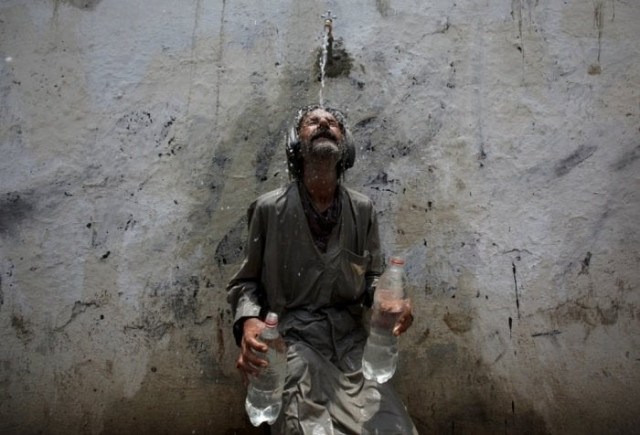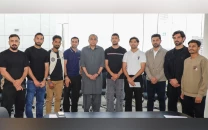Death toll from deadly heatwave in Karachi surpasses 800
Heatwave shows signs of easing as temperatures in the city drop from the 40-plus highs of recent days

A man cools off under a public tap in Karachi. PHOTO: REUTERS
Temperatures in the city were forecast to peak at 38 degrees Celsius down from the 40-plus highs of recent days. The government declared a holiday in the city to encourage people to stay home and cool off.
The heat wave has coincided with severe electricity cuts and the holy month of Ramazan, when most Muslims do not eat or drink during daylight hours.
Many of the deaths, among the elderly and poor in Karachi, were caused by dehydration.
Read: Death toll from deadly heatwave crosses 700
"The heat wave death toll has reached close to the 800 mark in the last four days," Anwar Kazmi, a senior official of the private charity, the Edhi Foundation, told Reuters.
"We are planning to expand the Edhi morgue to cope with a situation like this in future."
The charity runs a network of ambulances, clinics and morgues to bridge the gaps in an overburdened and poorly funded by public health system in the city of 20 million people, home to Pakistan's main stock market, central bank and biggest port.
Read: PM orders emergency measures as death toll exceeds 425
Government health officials did not return calls seeking comment.
A sea breeze slightly cooled parts of the city on Wednesday but rains predicted by weather officials did not arrive. Winds have shifted to the southwest, blowing cooler air into the port city from the Arabian Sea, and the Met Office has predicted rain, which would bring lower temperatures.
The government has demanded urgent action to deal with the crisis, and the administration in Sindh province declared Wednesday a public holiday to encourage people to stay indoors out of the sun.
Some residents on Tuesday took to hosing each other down with water to avoid collapsing from heat stroke.
A state of emergency is in force in hospitals which are struggling to cope with the 3,000 people affected by heatstroke and dehydration.
The change in weather will come as welcome relief for the economic hub, where maximum temperatures have hovered around 44 to 45 degrees C since Saturday.
The National Disaster Management Authority has been setting up dedicated heatstroke treatment centres to try to cope with the volume of patients.
Blasting summer heat is not unusual in Pakistan, and some parts of the country regularly experience higher temperatures than those seen in Karachi this week, without serious loss of life.
Many residents are furious with the civilian government over the electricity cuts and the poor state of the public hospitals treating many of those who have fainted from the heat.
Read: Govt mulls use of cloud seeding technology for artificial rains in Karachi
Public services in Pakistan are starved of resources because almost all its wealthy evade taxes. Fewer than 0.5 per cent of citizens pay income tax; many legislators are among the tax dodgers.
The army has set up 22 health centres where it also hands out water and rehydration salts.
Grave statistics
The government is yet to collect and collate the exact death toll in four days, but the management of different hospitals around the city have reported the following figures: 260 people were either brought dead to or died during treatment at the JPMC, 112 at Karachi Metropolitan Corporation-run hospitals (including the Abbasi Shaheed Hospital), 93 at the Civil Hospital Karachi, 62 at the Liaquat National Hospital, 40 at the Indus Hospital, 37 at the Ziauddin Hospital (Clifton, North Nazimabad and Keamari), 32 at the Sindh Government Qatar Hospital Orangi, 20 each at the Aga Khan University Hospital and the Lyari General Hospital, 15 at the Sindh Government Hospital New Karachi, six at the Sindh Government Hospital Liaquatabad, three at the Sindh Government Hospital Malir and two at the Sindh Government Hospital Korangi.
Read: Fatal heatwave: Karachi running out of space for the dead
Meanwhile, a total of 18 sunstroke-related deaths have been reported from six Hyderabad districts. Most of the victims were the elderly. Six people ranging between the ages of 55 and 70 years were reported dead in the last 24 hours alone.
Five deaths have been reported from Tando Allahyar, while two minors were among three people who fell victim to the heatwave in Thatta. Two people have been reported dead in Badin, while one death each was reported from Jamshoro and Sujawal.
The heatwave has also claimed three lives in different parts of upper Sindh, where a large number of people, especially the elderly and children, have been afflicted with gastroenteritis.
A labourer died near Sukkur on Sunday, while a schoolteacher near Sukkur and another person near Dadu were reported dead on Tuesday.




1733130350-0/Untitled-design-(76)1733130350-0-208x130.webp)














COMMENTS
Comments are moderated and generally will be posted if they are on-topic and not abusive.
For more information, please see our Comments FAQ